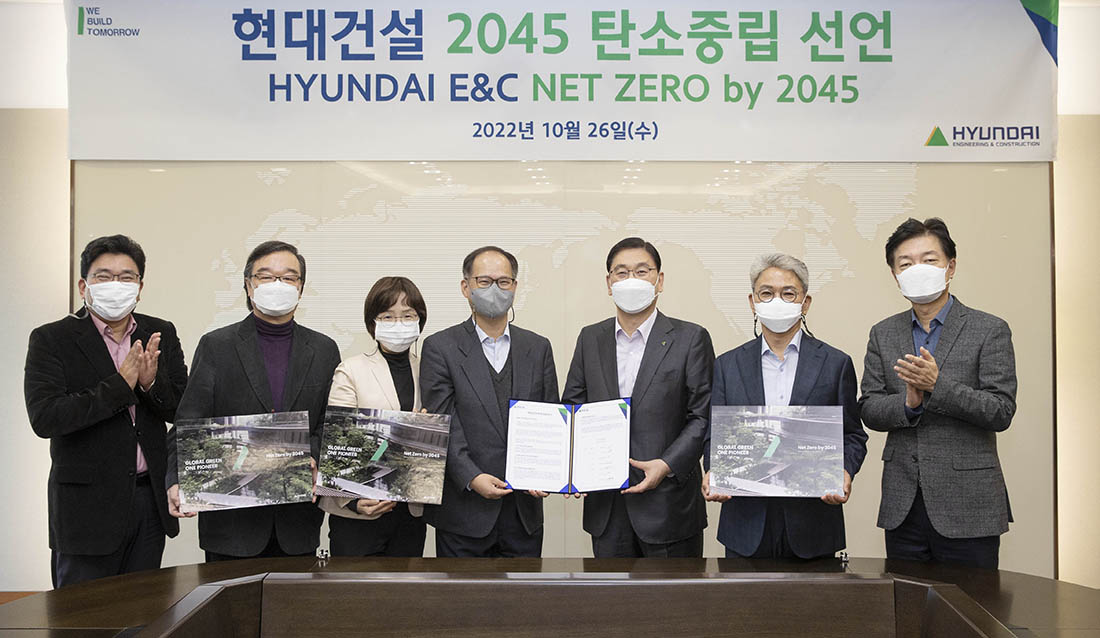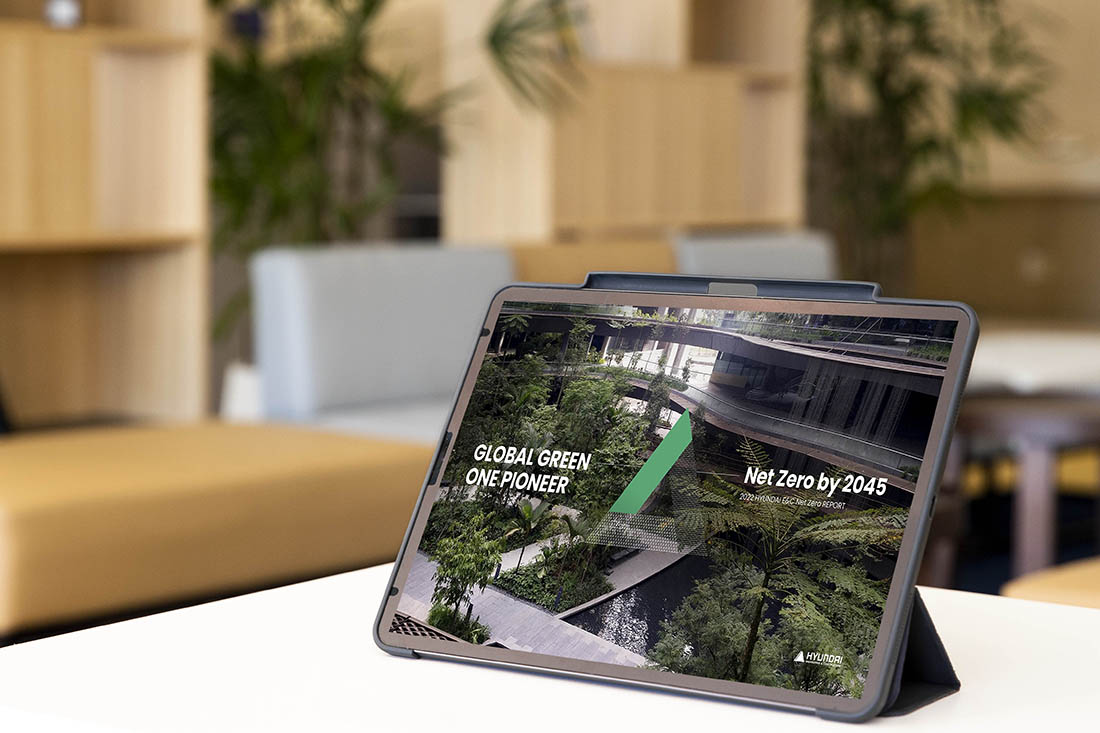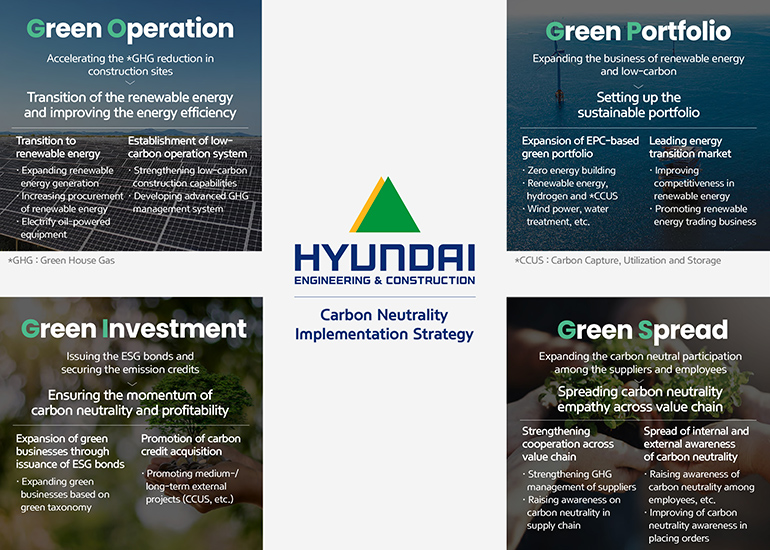Press Release
Hyundai E&C Declares Carbon Neutrality by 2045 – Driving the Transition to an Eco-friendly Construction Ecosystem
▲ Announced SBTi-based carbon neutrality for the first time among construction companies in Korea and released its strategy to create a sustainable construction ecosystem
... Establishes carbon neutrality strategy based on SBTi standards, a global initiative regarding carbon neutrality
... Sets a goal to include emissions produced throughout the corporate value chain emissions (scope 3) in addition to direct and indirect greenhouse emissions (scopes 1 & 2).
... Plans to achieve zero-emission by 2045, reducing 38% of carbon emission by 2030 (compared to expected amount of emission)
▲ Published the Net Zero Report that incorporates specific strategy and implementation plan to achieve carbon neutrality
... Promotes to implement systematic carbon neutrality efforts based on “G-OPIS,” 4 major implementation plans in consideration of the nature of the construction industry
... Builds a regular monitoring report system for climate change risks through the Transparent Management Committee
... Plans on monitoring the implementation process … and republish the report every five years considering the changes in the construction market and reflects the overall status of value chain
Hyundai E&C will achieve carbon neutrality by 2045.

[ Hyundai E&C declared “carbon neutrality by 2045” for the first time among listed construction companies in Korea through the resolution of the Board of Directors on the 26th. It announced carbon neutrality implementation strategy via “Global Green One Pioneer: Net Zero by 2045” a report that reflects the company’s carbon-neutral vision. Representative Director Yoon Yoeng-jun (third from the right) and Directors Kim Gwang-pyeong, Kim Jae-jun, Cho Hye-kyeong, Hong Dae-sik, Jeong Mun-ki and Hwang Jun-ha (from the left) are taking a commemorative photograph after the board of directors’ meeting. ]
For the first time among listed construction companies in Korea, Hyundai E&C pronounced “Carbon Neutrality by 2045” and released its carbon neutrality implementation strategy through “Global Green One Pioneer: Net Zero by 2045,” that includes the company’s carbon-neutral vision.
The Report contains global level goals established based on *SBTi, a global initiative related to carbon neutrality and direction of implementing systematic greenhouse gas emission founded on the four main G-OPIS strategies (▲Green Operation ▲Green Portfolio ▲Green Investment ▲Green Spread) set considering the traits of the construction industry, and key assignments.
* SBTi (Science Based Targets initiative): A global initiative based on scientific evidence that establishes and verifies a company’s goal to reduce greenhouse gas emission.

[ Net-Zero Report that covers 2045 carbon-neutral vision ]
Hyundai E&C is now responsible for greenhouse gas emitted directly and indirectly at the site (*Scope 1 & 2) together with reducing emissions produced throughout corporate value chain, namely, partner companies and logistics (*Scope 3) by 38% based on the expected emission compared to the *base year by 2030, and achieve zero carbon emissions by 2045.
* Scopes 1, 2 and 3: Scope of greenhouse emissions according to greenhouse accounting process and GHG protocol
* Base year: The base year of Scopes 1 & 2 is 2019 and Scope 3 is 2020.
■ Four Carbon-neutral Strategies of Hyundai E&C
G-OPIS (▲Green Operation ▲Portfolio ▲Investment ▲Spread)
<Green Operation> Converting renewable energy and forging a low-carbon building operation system
Hyundai E&C embarks on its efforts to achieve carbon neutrality at the site, the foundation of construction companies. It improves energy efficiency on-site and uses self-generated electricity by installing solar panels on the roof of on-site offices and unemployed land. Furthermore, the corporation expands the usage of renewable energy by purchasing *PPA for additionally required power. By 2030, all vehicles for business use in Korea will be converted to eco-friendly vehicles and reduce fuel consumption by applying automotive construction equipment in the mid-to-long term.
* PPA (Power Purchase Agreement): A power purchase agreement is a system that allows businesses or households to sign a contract directly with renewable energy supplier to receive electricity.
Moreover, carbon emission is minimized by continued enhancement of capacity to include the development of smart construction technology. Applying BIM, IoT and other smart technologies will optimize the construction process, e.g., construction, purchasing and logistics, which in turn decreases energy consumption. Advancing existing greenhouse management system through automating emission data collection system will also allow the corporation to manage greenhouse gases more systematically.
<Green Portfolio> Expanding eco-friendly portfolio based on EPC competitiveness and dominate the energy conversion market
Hyundai E&C is expanding its eco-friendly portfolio in each sector such as zero energy building, hydrogen plant and CCUS (Carbon Capture, Utilization and Storage) business. This is based on EPC (Engineering, Procurement, Construction) competitiveness that Hyundai E&C raised to date. It completed the first high-rise (36-story) zero-energy apartment called Hillstate Lake Songdo in success, not to mention the basic engineering project for Boryeong clean hydrogen energy project. Against this backdrop, its technological capacity to design hydrogen plants gained recognition. In addition, Hyundai E&C is responsible for the investment and construction of Jeju Hallim offshore wind power generation project based on its offshore wind power generation technology that has been verified through the southwest sea wind power demonstration project.
Hyundai E&C has a wide range of experience from developing various renewable energy power plants, e.g., solar and wind power to engineering, constructing and operating projects. It intends to expand the scope of businesses as a renewable energy electricity mediator and promote renewable energy PPA project to be in the vanguard of achieving energy conversion and carbon neutrality.
<Green Investment> Expansion of eco-friendly projects through ESG bonds and promoting external projects
Hyundai E&C issues ESG bonds in the medium to long term to secure a driving force for carbon neutrality. This will allow the corporation to enhance its competitiveness in eco-friendly technology of each business sector and expand the proportion of related infrastructure sales like renewable energy, dismantlement of nuclear power plants and water treatment. It intends to enhance credibility by way of selecting subjects of ESG bond based on the European and Korean green distribution system (excluding conversions parts) and establishing a sustainable goal affiliated with Hyundai E&C’s ESG strategy.
Carbon neutrality investment via ESG bond is pushed forward in mid-to-long term by linking it with eco-friendly portfolios including CCUS plant and new renewable energy power plant. Also, by implementing various external projects such as construction of eco-friendly plants in developing countries, the corporation will be able to acquire CER (Certificated Emissions Reduction), which will contribute to not only cutting down greenhouse gas emitted by Hyundai E&C but also global carbon reduction efforts.
<Green Spread> Reinforcement of cooperative system to achieve carbon neutrality in the value chain and spread of carbon neutral culture in Korea and abroad
Hyundai E&C also focuses on its capabilities on reducing greenhouse gas emitted during the course of producing or transporting building materials by partner companies. Hyundai E&C establishes “Greenhouse gas reduction management process of partner companies” to assess the amount of greenhouse gas emitted by major market companies and establish a customized management plan in consideration of the characteristics of partner companies. It aims to reduce 2.1 % of greenhouse gas emissions on an annual basis compared to 2015.
Given the global task of achieving carbon neutrality, Hyundai E&C board of directors and employees will continue to make efforts with the local community to make a change together. It plans on creating a sustainable society by carrying out various campaigns to form a consensus among employees, namely, conducting a competition for ideas to reduce carbon and coming up with eco-mileage system, and push forward social contribution activities with the proceeds from CER sales.
Hyundai E&C maintains effective communication with internal and external stakeholders by including the details of implementing carbon neutrality in its sustainable management report annually. The Transparent Management Committee consisted of outside directors only monitors pertaining issues and implementation process. A Net Zero report that reflects the status and changes of carbon neutrality of the construction market will also be published every 5 years to lead carbon neutrality efforts of the construction industry in the right direction.
At the same time, Hyundai E&C, the first domestic construction company to acquire international standard certificate for energy management system (ISO50001) in 2012, managed greenhouse gas emission through its IT-based environmental performance management system and organized a group with expertise in responding to carbon neutrality and eco-friendly sector, thereby responding to climate change crisis preemptively. Furthermore, it continues to expand its new renewable energy and eco-friendly projects gradually, proactively engaging in carbon reduction efforts.
Against this backdrop, Hyundai E&C was listed on the “Hall of Fame” for four consecutive years in the CDP (Carbon Disclosure Project) Korea Committee’s assessment of corporations’ response towards climate change. It became the first Korean construction company to join the platinum club and perceived as a global eco-friendly company.
Through a carbon-neutral message by Hyundai E&C saying, “We will lead a sustainable future by proactively responding to climate change, the most critical assignment of humanity,” the corporation demonstrated its commitment to “lead an eco-friendly construction ecosystem based on the construction competitiveness accumulated from various business sectors.”



